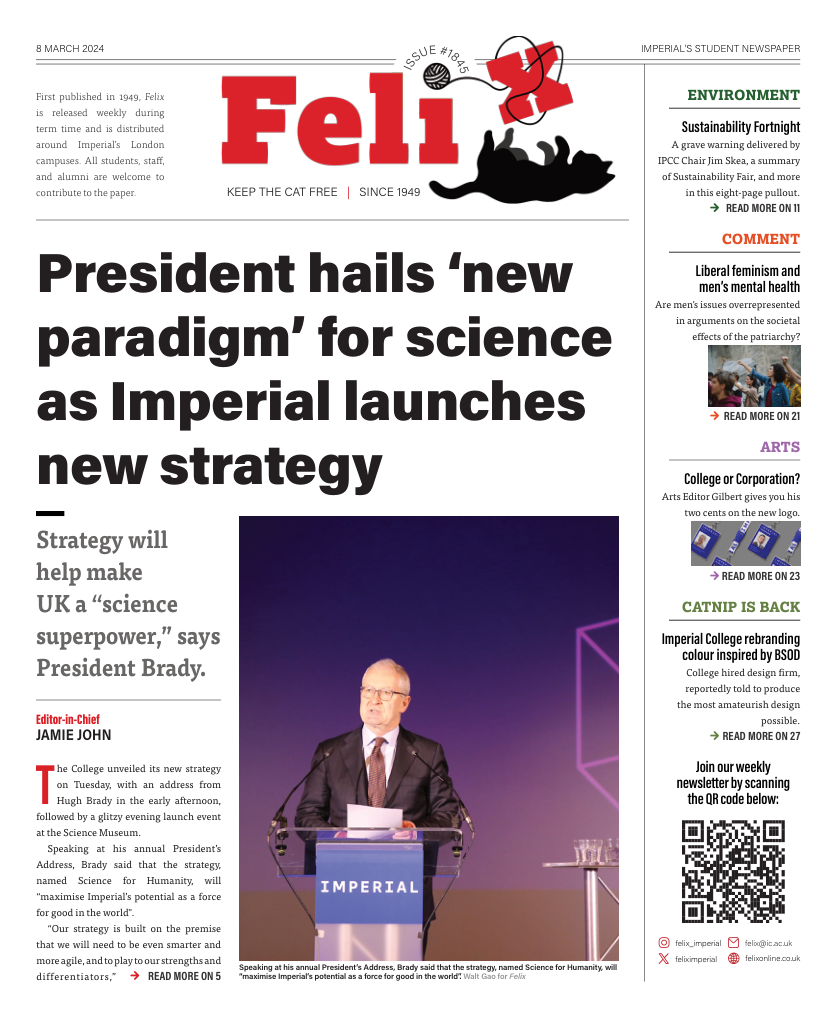Sustainability Fortnight recap
Sustainability Fortnight was a blast, but you might not have known about it.
Imperial College and the Student Union both send a barrage of emails every month, and every section of the College fights for attention on the advertising screens on campus. It would therefore not be surprising if even climate-conscious students missed that Imperial just dedicated ten entire days to showcasing its sustainability initiatives.
That is where Felix comes in.
Sustainability Fortnight was a packed two weeks of events, speeches, interesting ideas, and welcoming spaces. Here are our highlights:
- Professor Jim Skea talks about the United Nations and how dire the climate crisis is
- Imperial researchers co-author a report on how the Global South can finance strong climate policy
- London Student Sustainability Conference brings the brightest climate minds in London to Imperial
- Environmental Society hosted three social events
- Sustainability Fair 2024: full of aspiration, lack of attendance?
Sustainability is valued at Imperial for longer than its designated fortnight. To get involved in local climate action, we’ve collected the details of groups and initiatives from Imperial on page 20.
Message from Harriet Wallace, Imperial’s Sustainability Strategy Director
“We are doing so much to make Imperial more sustainable that this year sustainability week became a fortnight. We hosted the London Student Sustainability Conference here with Imperial College Union – with many inspiring talks and posters from students from Imperial and beyond – and had lots of staff and students join events on laboratory sustainability, launching the Green Impact scheme, a sustainability fair and much more.
“As you’ll see, Sustainable Imperial is a priority initiative in the new Imperial Strategy out this week, which highlights the huge investment we plan to make in sustainability, including tackling our biggest impacts on the climate by decarbonising our campuses and adopting more sustainable procurement practices.
“I would encourage everyone to get involved in making sustainability part of how we do things here at Imperial – you can find out more and sign up to the newsletter on our website.”
Professor Jim Skea, chair of the IPCC, brings a warning so grim it’s still concerning after being edited by 195 countries
Jim Skea, chair of the United Nations Intergovernmental Panel on Climate Change (IPCC), kicked off Sustainability Fortnight on Monday 19th February with a summary of the IPCC’s recent findings and discussion of how the process works.
Skea was very clear when discussing the findings of the reports reminding us that “we are not well adapted to the climate in which we are living.” He showed us the need to mobilise capital to support mitigation and adaptation and how Nationally Determined Contributions are “still falling well short” of meeting internationally aggreed long-term temperature goals .
The IPCC works by consensus so it’s the nature of the role that Skea doesn’t get to use the same kind of language as United Nations Secretary General, Antonio Guterres. In response to Working Group 3’s report in the sixth assessment cycle, Guterres said, “Demand that renewable energy is introduced now at speed and at scale. Demand an end to coal-fired power. Demand an end to all fossil fuel subsidies.” On the same report, Jim Skea said “we are not talking about business as usual if we are going to address the challenge of climate change” back when he was co-chair of working group 3.
Skea’s presentation, titled The need for science in a carbon-constrained world, discussed how the IPCC informs policymakers and some key figures from the latest assessment cycle. It didn’t explain well what scientists can do now that there is already such unequivocal evidence of climate change.
The Paris Agreement, agreed in 2015, has three main goals:
- To limit warming to well below 2°C, while pursuing effort to limit the increase to 1.5°C.
- To increase the ability to adapt to the adverse impacts of climate change and foster climate resilience and low greenhouse gas emission development.
- To make finance flows consistent with a pathway towards low greenhouse gas emissions and climate-resilient development.
The IPCC seeks to address all of these.
Skea pointed out that we need to make a 43% emissions reduction by 2030 relative to 2019 to meet the 1.5°C target, and that the “risks for a given level of warming are larger than we thought” when comparing the findings of the sixth assessment cycle to the fifth. An alternate pathway to 1.5°C in 2100 would be to allow some temporary overshoot, and in this scenario, emissions would need to peak in or before 2030.
The Illustrative Pathways shown below highlight some of our options for addressing global warming. We’re on track for between 2.2 and 3.5°C of warming right now. However, scenarios such as the IMP-LD show we have other options. This pathway leans on behavioural change early to give hard-to-decarbonise sectors the chance to do just that, and in doing so would keep warming to 1.5°C.
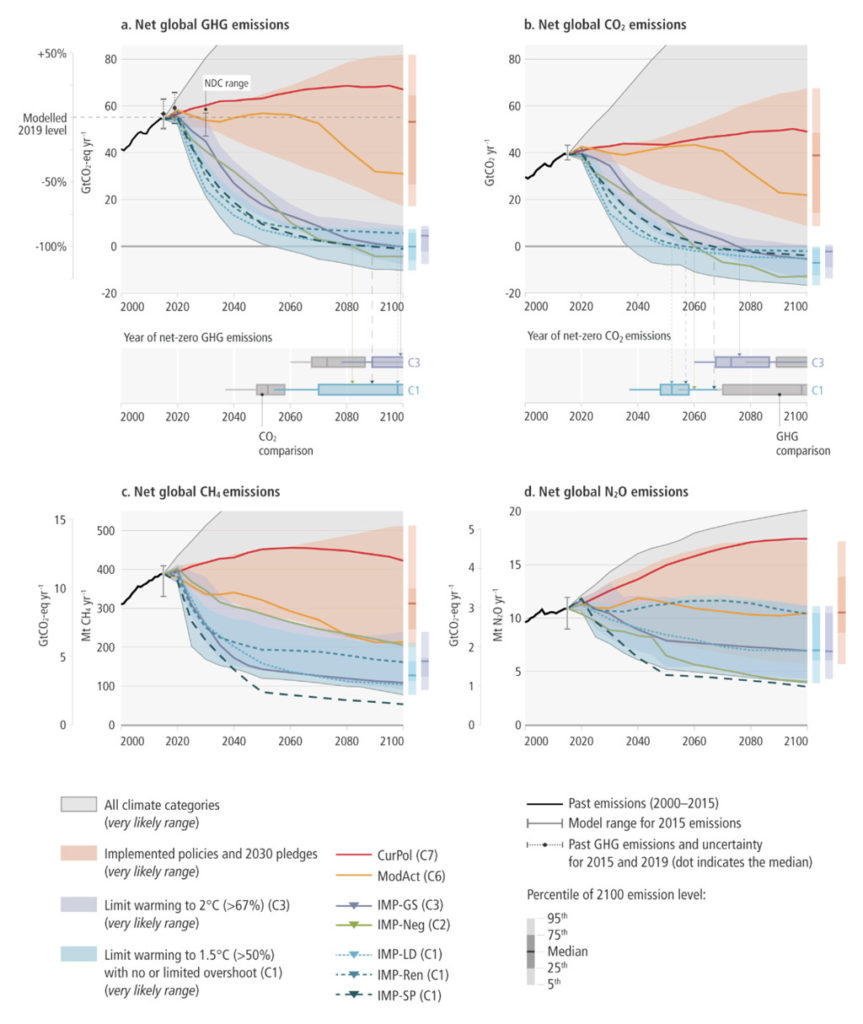
There are big financial gaps that need to be filled to combat climate change. Investment needs to scale up 4 or 5 times to mitigate further global warming and even more toadapt to the effects of climate change. “Adaptation and mitigation - there’s no choice between them, they’re complimentary,” said Skea.
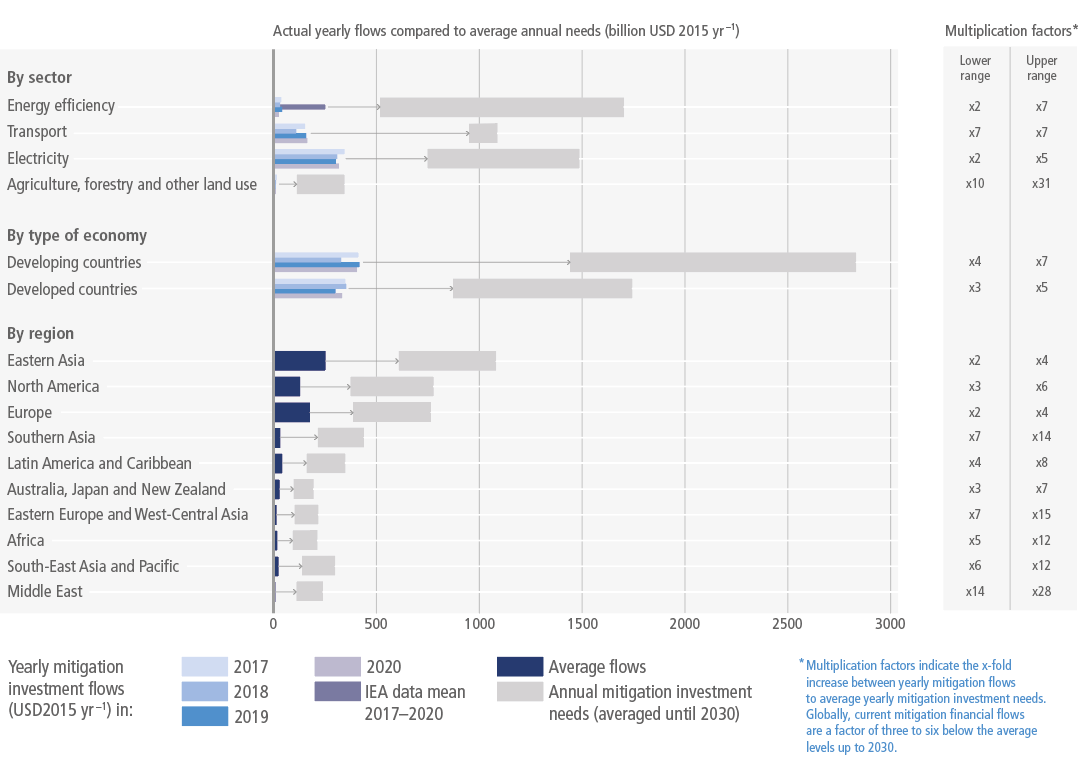
That said, investment in mitigation options like wind, solar, and improving energy efficiency generally saves individuals money in the long run. Project Drawdown reached similar conclusions across many of the solutions they assessed. Drawdown estimates it would cost $0.92-1.89 trillion to build onshore wind turbines but they would reduce emissions by up to 143.56 GtCO2e by and result in $3.77-9.83 trillion in lifetime net operational savings .
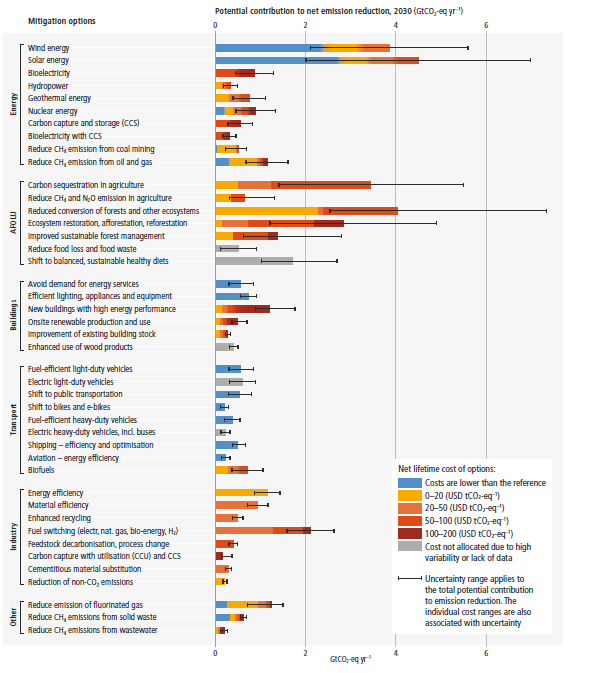
There is currently no timetable for the seventh assessment cycle after the IPCC weren’t able to agree one in the time they had. Skea said chairing the “IPCC is not easy but it’s worth it.” Skea is an emeritus professor at Imperial and was happy to highlight the relationship Imperial has with the IPCC.
London Student Sustainability Conference 2024
Imperial College hosted the London Student Sustainability Conference 2024 (LSSC) on Wednesday 21st February. The event, with students from 10 collaborating universities, ran from 10:00 to 19:00.The welcome address featured Dr Omnia El Omrani and Laura Young, who spoke about their work as climate activists.
The day was split into five sessions, each of which consisted of multiple talks or workshops running in parallel. Research and projects were showcased from across the participating universities on topics including the psychology behind fast fashion,power dynamics in UK agriculture, anddigital sustainability.
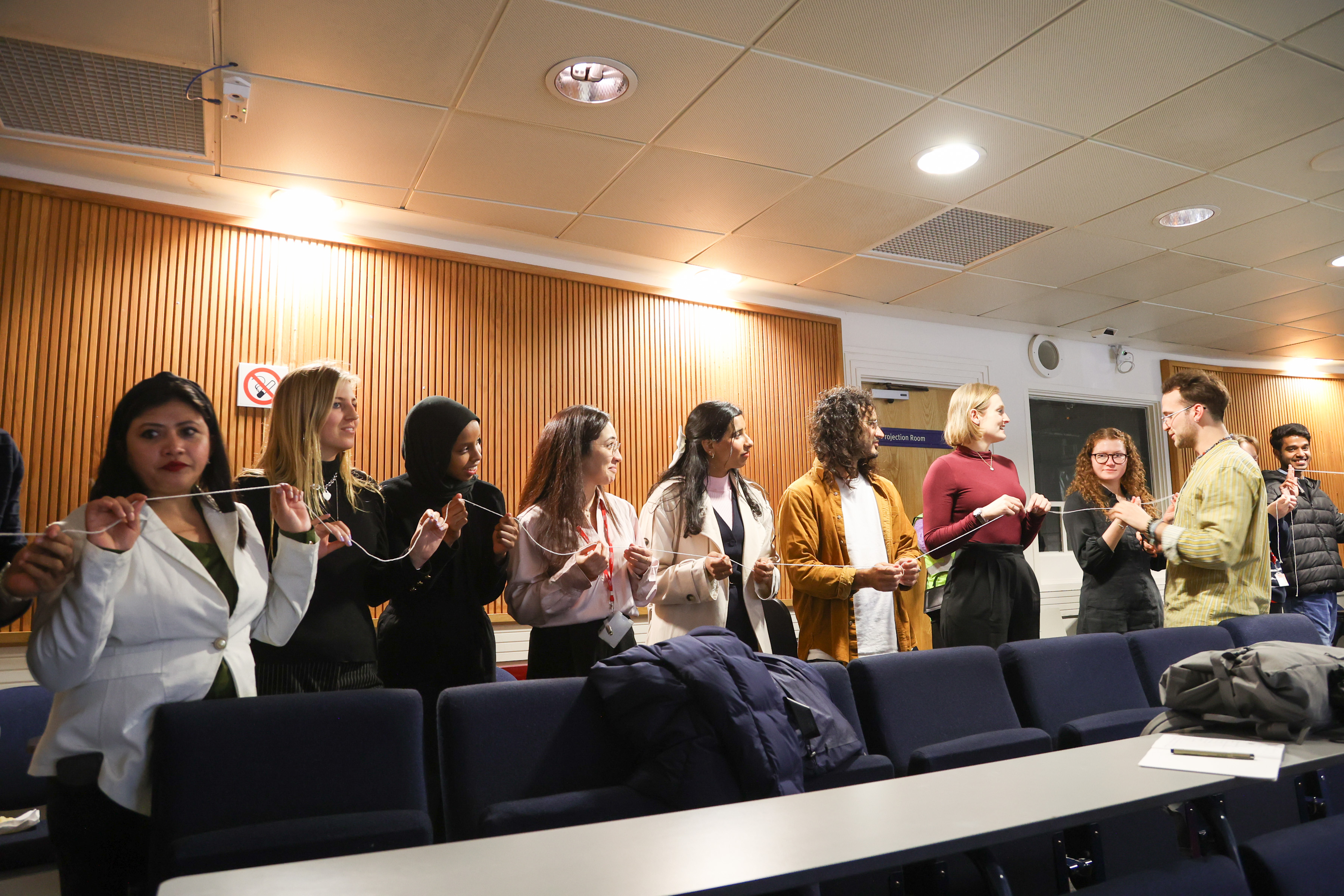
Natalie Jakiemiec spoke about The Future of Surplus Food Redistribution (SFR). She highlighted a crucial dissonance between doing SFR to address food insecurity and doing it to address food waste. If the goal of SFR is to reduce food waste, we’ll eventually run out of waste to donate. She also did not want SFR to be described as “leftover food for leftover people”. She went on to speak about how SFR is framed in policy and what lessons we might take from that.
The Student Sustainability Research Conference and the LSSC swapped speakers. Blessing Mucherera from the Student Sustainability Research Conference told us about Hull, the city most at risk of flooding in the UK. In his talk Inclusive Floodscapes: Empowering Minoritised Ethnicities for Urban Flood Resilience, Blessing explained how he is using a serious game to educate the people of Hull about the risks of flooding and gather data for his research. He also highlighted issues residents face accessing flood policy.
Eliott Stoclet and Milan Paczai from Imperial’s Education Office took an issue they saw with the conference into their own hands. Because information is given one way to people attending talks, we’re not building the connections that we need to address the Ccimate crisis. Their talk provided an opportunity for attendees to notice each other. Milan shared his personal concerns and asked us to do the same in a bit of mindful journaling. Eliott had us stretch, lock eyes with a random person, and finally all stand in a circle holding a piece of string. As I write this, I am still wearing my bit of the string around my wrist.
The other opportunity for networking was lunch, featuring vegetarian and vegan food. The line, which stretched so far that it looped back round to where the food was, was a highlight.
Posters of sustainability research from the partner universities were displayed all day at the back of the Great Hall, sparking conversations at the networking afterwards. During the closing remarks, awards were presented for the best posters submitted beforehand.
The conference focused on adapting to combat climate change, with a distinct lack of talks on mitigating its effects. This is a broader problem in the climate space, even though mitigation requires more funding. Despite that, I found the day energising and informative. I would thoroughly recommend attending next year if you can – perhaps online depending on where it is hosted.
Sustainability Fair
The annual celebration of local environmental groups was split into two rooms this year - did it work?
The Sustainability Fair was on Wednesday 28th February from 11:00-15:00 in the Sherfield Building and 12:00-18:00 in Metric.Stalls in the Sherfield Building were run by the Grantham Institute, central Sustainability Hub, Move Imperial, and Students Organising for Sustainability UK’s Green Impact initiative. The Gran- tham institute is Imperial’s premier climate research collective. They promoted plant-based milk, and other initiatives individuals can take to fight climate change, at the fair. Move Imperial handed out high-visibility jackets and other tools for cyclists to stay safe in London. Green Impact was present to promote its new partnership with Imperial, where research groups can compete to have the most sustainable operations.
The coveted Sherfield Building spots were a subject of envy among those in Metric – especially from those running the repair workshop, who had been in the Sherfield Building in previous years, and PBU, who had been told they had a space in the Sherfield Building only to have arrangements changed last minute.
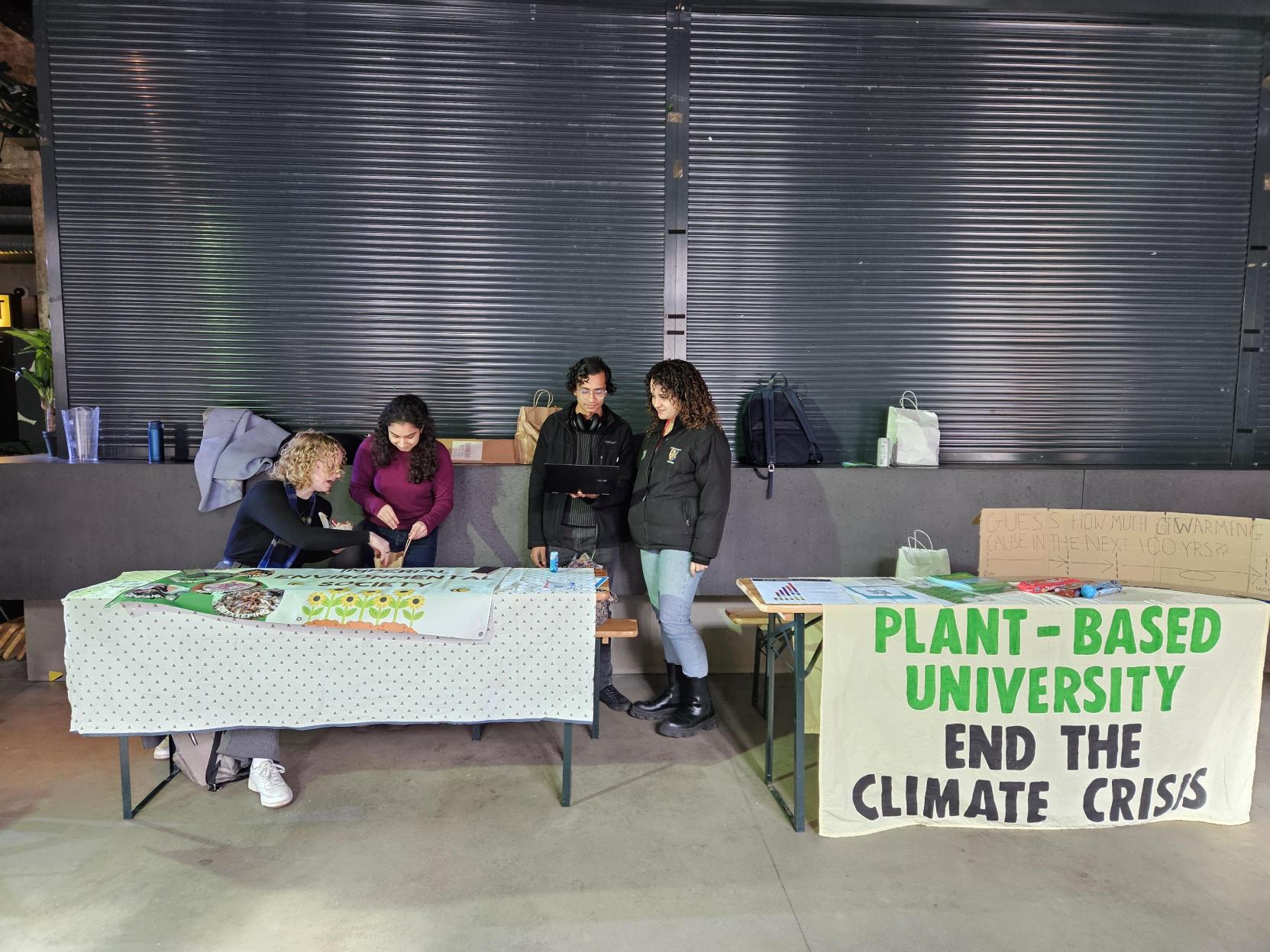
The Sustainability Fair was on Wednesday 28th February from 11:00-15:00 in the Sherfield Building and 12:00-18:00 in Metric. The event was supposedly publicised but the total attendance in Metric was – generously – 10 people. I was at the Plant Based Universities stall for four hours and saw maybe one person.
The unexpectedly low traffic at Metric at 14:00 caused frustration among the people working the stands, who began packing up hours before the event was supposed to end. One activist on the day said “this is absolute sh*t” before packing up their stand early and leaving.
The four of seven stalls which were relegated to Metric were Plant-Based Universities (PBU), Environmental Society, Students Organising for Sustainability (SOS), and a Repair & Upcycling workshop. For more information about getting involved, check the last page of this pull-out.
At the repair workshop, I had the opportunity to repair several holes in my waterproof jacket – the design of which they called “just stupid” – while sitting at the PBU table.
All the stalls in Metric addressed critical areas where behaviour change is needed – exactly what one could hope to achieve at a better-placed stand. PBU encourages eating more plants, which is the most significant behavioural change we can make to reduce our emissions according to the Intergovernmental Panel on Climate Change. Environmental Society’s gardening does crucial work connecting people to nature and their campaigns for Ecosia on Campus (read more in Felix issue 1821) and abolishing single-use plastics promote easy wins that could do with more popular support. SOS is a national campaign encouraging specific actions for students and organising within halls to improve sustainability. Repairing and upcycling clothing is critical to the circular economy and addressing fast fashion.



